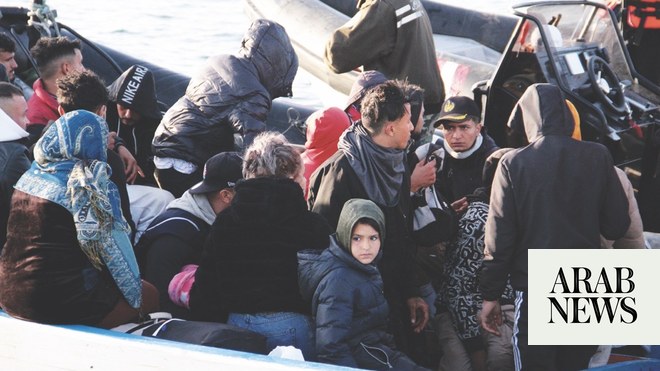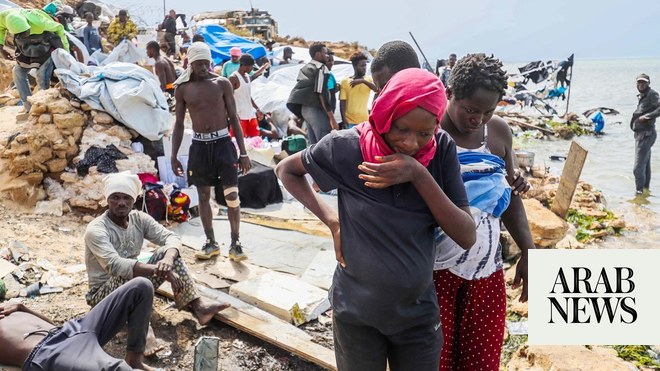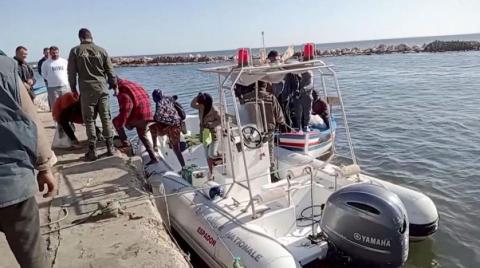
A string of deadly shipwrecks since May have left the North African country overwhelmed with bodies
GABES: A putrid odour lingers outside a morgue in Tunisia’s coastal city of Gabes as dozens of bodies of would-be migrants to Europe pulled out of the sea await burial.
A string of deadly shipwrecks since May have left the North African country overwhelmed with bodies and struggling to find them a final resting place.
More than 80 drowned migrants have been retrieved from Tunisian waters — most of them victims of a deadly July 1 shipwreck that left only three survivors.
Fished out of the sea between the port city of Zarzis and the tourist island of Djerba in the south, their bodies were brought to Gabes hospital — the only facility in the region capable of taking DNA samples.
Under pressure from civil society groups, Tunisian authorities have stepped up efforts to systematically collect the DNA of each unidentified drowned migrant, hospital director Hechmi Lakhrech told AFP.
The samples could well be the only hope of informing the victims’ families of their fate, he added.
In the basement morgue, staff use surgical masks or simple scarves to fend off the stench of bodies stacked one top of the other on the floor.
Since July 6, the numbers have “overwhelmed” the morgue’s 30-body capacity, said Lakhrech.
With just two forensic doctors and two assistants, not to mention a lack of equipment, the facility is struggling to keep them properly stored, he added.
After forensic tests, the bodies are kept at the morgue until a burial site is found, which in Tunisia is complicated, according to Gabes governor Mongi Thameur.
Many municipalities have refused to allow the drowned migrants to be buried in their cemeteries.
“Some fear the bodies carry cholera, and others refuse to bury people in Muslim cemeteries if their religion is unknown,” he told AFP.
It comes down to “a problem of mentality and also of humanity in some cases,” he said, adding that many people needed to be “sensitised.”
At the Bouchama cemetery, the only one in Gabes to have so far accepted migrant bodies, 16 graves dug off to the side lie empty.
“My parents are resting here, I don’t want non-Muslims to be buried by their side,” said one local resident.
In front of the hospital, the stifling midday heat beats down as 14 white bags are carefully loaded onto the back of a garbage truck.
Once loaded, it will make the two-hour journey to Zarzis, where an improvised cemetery flooded with the bodies of migrants for several years is now full, and a new one has just been opened.
Each grave is marked with a simple plaque bearing the victim’s DNA file number and burial date.
“On July 12, we collected 45 bodies in one day!” said Zarzis deputy mayor Faouzi Khenissi, calling it a “phenomenal problem.”
The city has taken in the bodies “because we have this culture, we can’t just leave the remains unburied,” he said.
Zarzis is a hotspot for illegal departures to Europe and Khenissi says some of the city’s own youth have also been victims of the wrecks.
Municipal workers and officials take shifts volunteering after work to conduct the burials.
After three hours of prep under the blazing sun, 14 bodies are buried alongside the 47 others already laid to rest at the new site, just outside a shelter for rescued migrants.
Mongi Slim of the country’s Red Crescent called for “international mobilization” to address the issue which “does not concern Tunisia alone.”
“The country is already struggling to take care of rescued migrants, but even more so for those who’ve died.”












